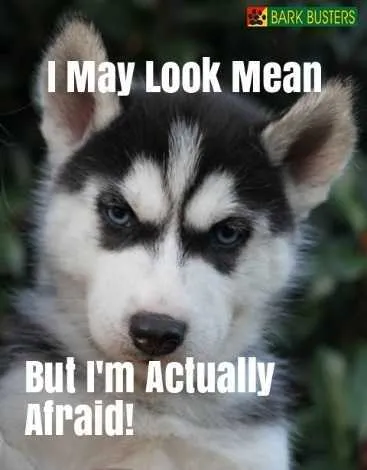Is Your Dog Afraid?

Do you know if your dog is afraid?
Knowing the signs of fear in your dog can help you to address this emotion before the fear escalates. Often when we visit a home, we see that behaviours such as aggression, biting, barking uncontrollably, destructiveness and submissive urination may be rooted in fear. Fear in dogs manifests itself in different ways depending on what your dog is afraid of. It can also depend on their temperament.
Bark Busters bases its training on using voice tones and body language to communicate with your dog. Conversely, a dog's body language can tell you a lot about what they are feeling. Hair standing up, a tail tucked between their legs, an avoidance of eye contact can all be signs of fear. When dogs are scared they often have a fight or flight instinct. If given a choice, most dogs will choose flight, but some will choose to fight first. If not given an escape path even those who would rather run away will fight.
Common dog fears include:
- Being left alone (separation anxiety)
- Car rides
- Children
- Going up and down the stairs
- Loud noises (fireworks, thunder, lightning, vacuuming)
- Unfamiliar dogs or people
- And even you!
How to Help: What is the first step in helping these dogs?
Establishing yourself as the leader, someone who your dog trusts and respects. Your job is to help them face their fears and to not overwhelm them. They need to know that you are in control and will keep them safe. Only then can they relax, knowing they are in good hands.
Helping your dog overcome their fears may be a slow process. If your dog is afraid of cars and trucks, don't walk them along a street where cars are roaring by. Start the process at a place where they can see the traffic from a distance. Don't move closer until they are consistently calm at the distance.
Sometimes the process can be very quick. I worked with a client whose Shepherd mix was afraid of strangers. When he first met me, he was growling and snarling and showing only the whites of his eyes. If I had moved he would have attacked me. During our training session and some fear-vanquishing exercises, you could actually see the tension melt off him. At the end of the session, he came over to me, put his head in my lap and looked up at me as if to say thank you.
Watching your dog's reaction and reading their body language will tell you how to proceed. If they're staying tense or releasing adrenaline you need to go slow. If they show signs of relaxing, you can proceed.
Dogs that do not receive an education are more likely to be afraid of new situations. They don't have the ability to fully understand our world. It's up to us to guide them.
Some dog trainers use force or punishment on aggressive or destructive dogs. In a sense, a fearful dog expects to be punished. That may be one reason why the dog is fearful. This is the connection you need to break without punishment.
When I walk my dog, we'll often find something we haven't seen before. I'll stop next to it and let him assess and learn what it is. If I just try and walk my dog next to it he's liable to try and give it a wide berth because he's unsure of it. Once I guide him through learning about the object he'll calmly walk past it the next time we see it.
Dealing with our dog's fears is certainly worth the effort. When your dog is afraid, they are also stressed. Their stress often creates stress in us. Dogs will read our reactions and sometimes we give the wrong signals. When we help our dog through their fears wonderful transformations can take place. Your dog starts to relax and so do you. We've seen it time after time and we know the end result.
Remember that your dog may have been born with certain fears or developed them as a result of a scary circumstance. Your job is to desensitise your dog to certain triggers and/or teach them to associate them with something positive.
Recent Articles
- How To Keep Your Dog Cool in the Summer Heat
- Keep Your Dog Safe This Summer: Bark Busters’ Essential Tips
- Christmas Dog Safety Tips: Keep Your Dog Safe & Happy This Festive Season
- Dog Training for Snake Safety: Essential Tips for Australian Pet Owners
- Leash Training - How to Stop your Dog from Pulling on Walks
- Dog Aggression Training & Tips
- Halloween Safety Tips for Dog Owners
- Understanding and Training Dogs with Separation Anxiety
- Why Is My Dog Barking So Much? Understanding Excessive Barking and How To Help
- Dogs need education too!
